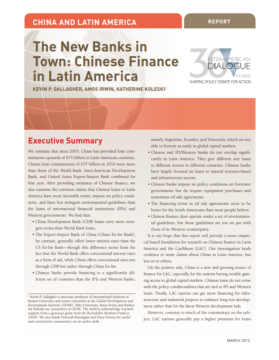Hugo Stay Home
Hugo Chavez, the Venezuelan president, has clearly been enticed by the Libyan drama, where his longtime friend and ally, Muammar al-Qaddafi, is under siege from rebel forces.
Tamara Taraciuk Broner, director of the Rule of Law program, participated in the podcast "Where Did the Migrant Crisis Come From?" on In the Room with Peter Bergen. She discussed the context and causes of the Venezuelan humanitarian and migration crisis, as well as the use of the lifting of US sanctions as leverage for fair elections.
"[Hugo Chavez]" came to power with a discourse that was very appealing for many who felt excluded from the political system for a very long time. This was at a time when Venezuela was benefiting from high oil prices and a lot of oil production, and it was with this enormous amount of funds that he was able to fund a long list of social programs that benefited many Venezuelans. He was able to politically take over the Supreme Court in 2004. He gained a huge majority in Congress, and that allowed him to govern with basically no limits and checks on what he was doing while in office. It is precisely this concentration of powers that has allowed the current government of Venezuela to commit all sorts of abuses without any checks on its power."
"The US has been a key actor in the ongoing political negotiations between the Venezuelan opposition and the regime because they actually have something to offer, which is lifting the sanctions that were diminishing the Maduro government's legitimacy in international markets."
[...]
Hugo Chavez, the Venezuelan president, has clearly been enticed by the Libyan drama, where his longtime friend and ally, Muammar al-Qaddafi, is under siege from rebel forces.
Estimates of the volume, composition, and characteristics of Chinese lending to the region since 2005.
Is the Venezuelan government likely to comply with the IACHR’s ruling or will it uphold the ban?
 In The Room with Peter Bergen
In The Room with Peter Bergen
